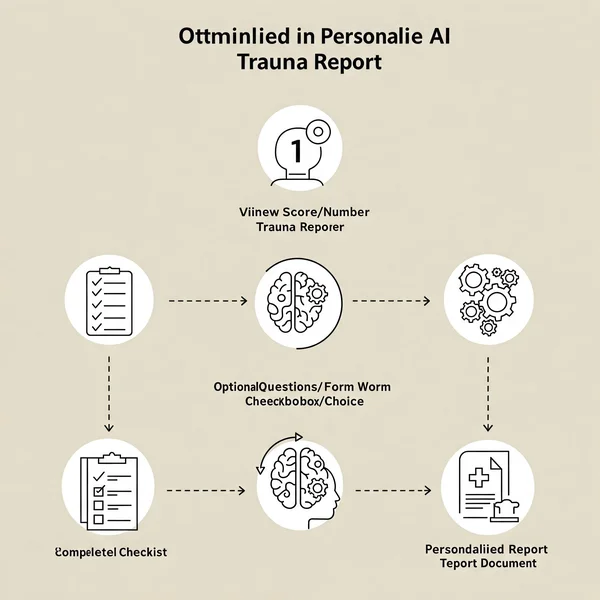Your AI Personalized Trauma Test Analysis
May 6, 2025 | By Nora Hayes
Have you taken an online trauma test and felt the score was just the beginning? While understanding your initial results provides valuable awareness, the path to deeper self-understanding often involves exploring the nuances behind the numbers. What is AI trauma analysis? It's the exciting new layer of insight now available at TraumaTest.org. We're thrilled to introduce our new AI Personalized Analysis feature, specifically designed to offer feedback tailored to your unique responses, moving significantly beyond a general score. If you're ready for a more specific perspective, discover deeper insights with our AI trauma analysis.

What is the New AI Trauma Analysis on TraumaTest.org?
This innovative feature leverages artificial intelligence to meticulously examine the patterns within your answers to our foundational trauma test, alongside any optional background details you decide to share. It's crucial to understand that this AI trauma analysis is not a diagnostic tool. Instead, its purpose is to provide personalized reflections and insights, helping you connect the dots between potential trauma symptoms and your life experiences in a way a standard score cannot. Think of it as a sophisticated mirror for your self-reflection journey.
Moving Beyond Numbers: The Goal of Personalization
A numerical score on a free trauma test offers a snapshot, but it doesn't capture the complexity of individual experiences, especially concerning childhood trauma or complex PTSD symptoms. The goal of our AI feature is personalization – to generate feedback that considers the context you optionally provide, such as the nature of distressing events (single vs. ongoing), symptom duration, and current coping mechanisms, making the insights feel more relevant and meaningful to you.
How AI Helps Understand Trauma Symptoms Better
How can AI provide these deeper insights? Our system analyzes the specific combination of your responses, identifying potential patterns and connections that might be overlooked in a simple score calculation. It looks at how different answers relate to each other, potentially highlighting areas related to common trauma symptoms (like emotional regulation challenges, relationship difficulties, or hypervigilance) and reflecting these observations back to you in a structured, understandable format. This facilitates a more comprehensive online trauma assessment experience.
How Your Personalized Trauma Report is Generated
Getting your unique personalized trauma report is a simple process integrated seamlessly after you complete the initial test. Here’s a step-by-step guide:
The Foundational Online Trauma Test
Everything begins with our standard, confidential 30-question online trauma test. This assessment forms the basis for both the initial score and the subsequent AI analysis. If you haven't taken it yet, you can start the free online Trauma Test here.
Enhancing AI Report Accuracy
Once you see your initial score, you'll be presented with the option to "View AI Personalized Analysis." Clicking this reveals a set of entirely optional questions designed to add context for the AI. What kind of questions are asked? These might touch upon whether the trauma felt like a single event or was ongoing, how long symptoms have been present, the degree of daily life impact, the coping mechanisms you currently use (e.g., exercise, talking, avoidance), your perceived level of social support, past experiences with therapy, and what aspects you're most hoping to understand from the trauma test results. Remember, sharing this information helps the AI provide a more accurate and relevant personalized trauma report, but it's completely up to you.

The Choice is Yours: Skip or Submit for AI Insights
You are in full control. If you prefer not to answer the optional questions, simply select "Skip to Basic Results." A confirmation prompt will appear. If you choose to provide the extra context to get the most tailored feedback, click "Submit & Get Personalized Assessment." Your privacy is respected throughout this process.
Behind the Scenes: AI Processing Your Data
After you submit (or choose to proceed without optional info), a brief loading animation ("AI is analyzing your data... 🚀") will appear. This usually takes just a few seconds while the AI processes your unique data points to construct your report.
Inside Your AI Analysis: Understanding the Insights
The AI Personalized Trauma Report is designed to be informative and easy to navigate. Here’s a breakdown of what you might find:

Your Unique Profile: The Core AI Analysis Text
This is the heart of your report. Instead of generic paragraphs, you'll find text generated specifically based on your individual response patterns, offering reflections that aim to resonate with your personal experience.
Identifying Potential Cognitive & Emotional Patterns
The AI trauma analysis may highlight potential cognitive themes (like negative self-perception) or emotional patterns (such as difficulty regulating emotions or experiencing numbness) suggested by your answers, linking them thoughtfully to common experiences after difficult events.
Reflecting on Coping Mechanisms
If you shared information about your coping mechanisms, this section might offer reflections on those strategies, perhaps noting common associations or effectiveness patterns seen in similar response profiles.
Recognizing Strengths and Resilience Factors
Healing involves acknowledging resilience. The AI looks for indicators of potential strengths – perhaps effective coping skills you are using, or perceived social support – providing a more balanced view.
Contextualizing Daily Life Impact
Understanding how potential trauma symptoms affect daily life is crucial. This section connects the dots between your responses and the potential impact on areas like work, relationships, or self-care, based on the information provided.
Actionable Starting Points: Learning Plan Ideas
The report may conclude with suggestions for areas of further learning or general types of self-care tools (like mindfulness resources or journaling) that align with the insights generated. This offers a gentle nudge towards potential next steps in your self-understanding journey.
Printing and Sharing Your Report
Want a hard copy or wish to discuss the insights with someone you trust (like a therapist)? New "Print Results" and "Share Results" buttons make this easy. Sharing creates a link to your generated report, not your raw answers, maintaining confidentiality unless you actively share the link. Why not explore the tool and see these features?
Important Notes on Your AI Trauma Assessment
This new AI trauma analysis feature is a powerful mental health tool for self-reflection, but it's vital to approach it with the right understanding.

AI Insights vs. Clinical Diagnosis: Know the Difference
Is the AI personalized trauma report free? Yes, it is. However, please remember: Neither the standard trauma test nor the AI trauma assessment provides a medical or psychological diagnosis. They are designed for informational and educational purposes only. Diagnosing conditions like PTSD, Complex PTSD, or assessing the impact of childhood trauma definitively requires a comprehensive evaluation by a qualified healthcare professional.
When to Seek Professional Mental Health Support
What should I do with my AI trauma analysis results? Use them as a starting point for reflection. If your results indicate significant distress, if the insights resonate deeply with persistent life challenges, or if you simply feel you need more support, it is strongly recommended to consult with a licensed mental health professional. This online trauma assessment can be a helpful tool to bring to your first therapy session to help articulate your concerns. You can learn more about our trauma test and its intended use on our main page.
Explore Your AI Trauma Analysis Today
Gaining clarity about how past experiences might be shaping your present is a courageous and empowering step. The new AI Personalized Analysis feature at TraumaTest.org offers a unique, confidential, and free trauma test experience, going beyond a simple score to provide nuanced, tailored insights for your self-understanding. It transforms our trauma test into an even more powerful tool to begin exploring your inner world.
Are you ready to discover what personalized insights your responses might reveal? Start your free trauma test now and unlock your AI Personalized Analysis!
We'd love to hear your general thoughts (no personal details, please!) on the potential of AI in supporting self-awareness in the comments below. How do you feel personalized feedback could aid in the healing journey? Sharing this resource might also help someone else take their first step.
AI Personalized Trauma Report: Your Questions Answered
-
How does the AI analysis differ from the basic trauma test score?
The basic score gives a general indication based on the number of endorsed items. The AI personalized trauma report analyzes the patterns across all your answers (and optional context) to generate specific text-based insights about potential challenges, coping styles, strengths, and impacts, offering a much richer and more individualized reflection than the score alone.
-
Is the information I provide for the AI analysis kept private?
Yes. Privacy is a top priority. The optional information is used only during your session to generate the personalized report. It is not stored long-term tied to identifiable information and is handled securely according to our Privacy Policy. The core trauma test remains fully anonymous.
-
Is the AI personalized trauma report free to use?
Absolutely. Both the standard trauma test and the enhanced AI trauma analysis feature are offered completely free of charge as part of our mission to make self-understanding tools accessible.
-
Can the AI analysis provide a diagnosis for PTSD or Complex PTSD?
No. This tool is strictly for informational and self-reflection purposes. It cannot provide a clinical diagnosis for PTSD, Complex PTSD, effects of childhood trauma, or any other mental health condition. A diagnosis requires assessment by a qualified mental health professional.
-
What should I do with my AI trauma analysis results?
Use your trauma test results, including the AI insights, as a starting point for deeper self-reflection. Consider which points resonate with you. If the report highlights significant distress or areas of concern, use it as a catalyst to seek support from a therapist or counselor. You can revisit the main TraumaTest.org page anytime to retake the test or explore further resources.